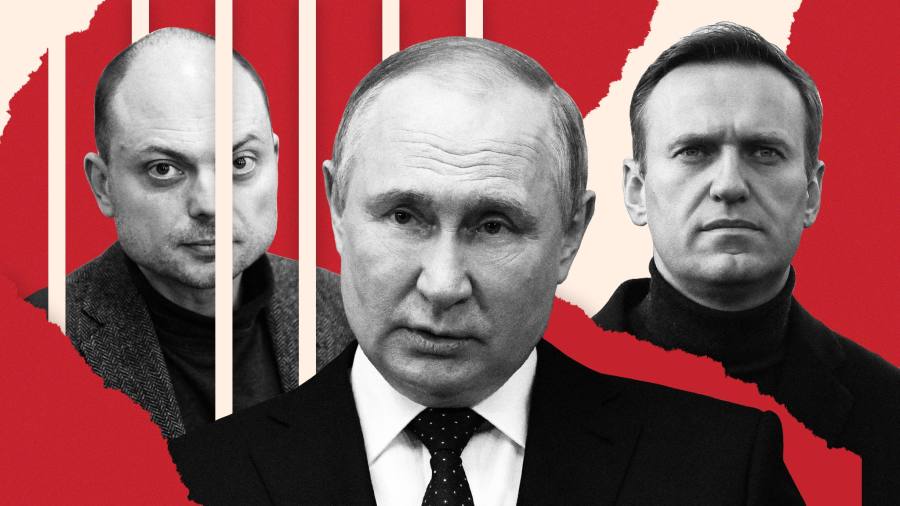The author is English managing editor at OVD-Info, a group monitoring human rights in Russia
More than a year into the full-scale invasion of Ukraine, my western friends often ask me: why don’t Russians protest? The answer is that some do — but protest is largely futile in the face of a decade-long Kremlin crackdown.
At OVD-Info, a Russian human rights organisation with several hundred affiliate lawyers, we see daily signs of resistance. We do our best to protect those persecuted for anti-war beliefs, a movement which persists despite draconian penalties. Russians from the Baltic Sea to the Pacific stand up against the invasion. Protests range from distribution of leaflets to solitary pickets and the burning of military recruitment offices.
The authorities respond by throwing dissidents into jail for decades and hounding activists. Vladimir Kara-Murza, an opposition activist, was imprisoned last month for 25 years on spurious charges of treason in a legal process that he likened to the trials of Joseph Stalin’s era. Alexei Navalny, another opposition leader, has been in prison since his return to Russia in 2021 from Germany, where he was recovering from an assassination attempt.
Ordinary Russians live in fear of committing thought crimes for opposing the war. The Kremlin’s repression did not emerge overnight on February 24 2022, when the full-scale attack on Ukraine started. It has evolved over time, shaped by fear of a democracy wave in the former Soviet Union and by preparations for war. To explain contemporary Russian protest, we have to understand how and why the Kremlin became so efficient at suppressing it.
Russians are best seen as a nation held hostage by an authoritarian ruler Vladimir Putin who, like the KGB security police he once worked for, became expert at stamping out dissent. As such, they are terrified of voicing their opinions. Those who speak to journalists are attacked by the regime. Only a minority of Russians are either ardently pro-war or ardently anti-war. The majority languishes in helplessness and fear.
We recently released a report on the use of article 212.1 of the Russian criminal code. It is a tiny part of the apparatus of repression, but it illustrates the Kremlin’s goals. The article targets politically minded people and frames activists as “repeat offenders”. First-time participation in an “illegal” protest or perceived participation in a protest (the authorities deem nearly all opposition protests illegal) normally yields only a fine, but a repeat offence could land you in prison for five years.
The article was introduced in 2014, partly in response to Ukraine’s Maidan revolution, and some two years after Russia’s 2011-2012 pro-democracy protests on Bolotnaya Square in Moscow, where thousands of people marched against Putin’s regime. Pro-government lawmakers called article 212.1 a “vaccine against Maidan”.
The Kremlin wanted to instil fear, and it worked. At first the article was rarely used, but when it was, it chilled activism and terrified the media and potential protesters. A sword of Damocles hangs permanently above their heads.
The introduction of this article was the first sign of the regime’s wanton persecution of protesters. We estimate that, since 2015, 496 people have been subject to criminal prosecution for protesting and more than 60,000 other protesters have been punished for minor offences. Every Russian protester now knows that by merely walking on the streets they might walk straight to prison. Still, they protest.
To finally quench the fire, many months before the full-scale invasion of Ukraine, the Kremlin embarked on a scorched-earth assault against civil society. Activists were exiled, organisations destroyed, their websites and funding blocked — OVD-Info included. Russians now fear openly expressing themselves as any action might be perceived as a “protest”.
The powerlessness of Russian protests to stop the invasion was to be expected. What was unexpected was that Russian civil society didn’t collapse in the face of this assault. Thousands of Russians went on to the streets anyway. Exiles continued anti-war activism abroad. Every major independent Russian media organisation opposed the war. Human rights groups like ours continued resisting the Kremlin’s authoritarianism.
So why don’t Russians protest? They do, but their protests are stifled by a powerful and cruel regime. If governments and people abroad want Russians to protest more, they should support Russian civil society and help us to overcome the fear. Together we can fight this evil.
Read the full article here




